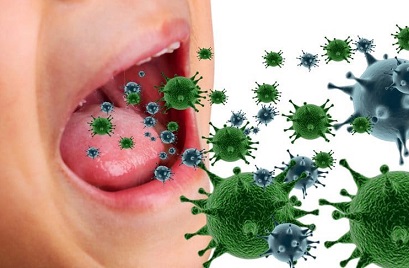Study Finds That SARS-CoV-2 In The Nasal Or Oral Cavity Is Activated By The Action Of Trypsin-Like Proteases And The Presence Of Anaerobic Bacteria
COVID-19 -News - SARS-CoV-2 - Oral Cavity - Trypsin-Like Proteases - Anaerobic Bacteria Jul 21, 2023 2 years, 6 months, 1 week, 5 hours, 9 minutes ago
Daily oral hygiene and reducing components derived from oral indigenous bacteria will help prevent SARS-CoV-2 infection
COVID-19 News: In the ongoing battle against COVID-19, scientists have been relentlessly seeking to understand how the SARS-CoV-2 virus operates within the human body.

A recent groundbreaking study conducted by researchers from the Osaka Institute of Public Health and the Toyama Institute of Health in Japan, in collaboration with the University of Toyama, has shed light on a crucial aspect of the virus's behavior i.e. how it gets activated and how oral hygiene may play a vital role in preventing infection.
Past studies and
COVID-19 News reports have already showed that SARS-CoV-2 virus enters the cells by targeting the angiotensin converting enzyme 2 (ACE2) receptor and transmembrane protease, serine 2 (TMPRSS2). But the research team delved deeper into the mechanisms of viral infectivity. They focused on the role of trypsin-like proteases i.e. enzymes that cleave proteins and their impact on the virus's ability to infect cells.
Intriguingly, the study team discovered that trypsin treatment could increase the infectivity of SARS-CoV-2 in clinical specimens taken from patients with COVID-19. The effect was especially significant with the delta variant, where infectivity increased up to a staggering 36,000-fold after trypsin exposure. However, the omicron variant showed a relatively milder increase, up to only a few dozen-fold. This suggests that different variants of the virus may respond differently to trypsin activation.
The study team also found that SARS-CoV-2 can form syncytia - giant, multinucleated cells formed by the fusion of infected cells - after trypsin treatment. This phenomenon has been linked to the virus's replication and the severity of COVID-19 symptoms.
Furthermore, the study explored the potential role of anaerobic bacteria residing in the oral cavity. Among them, a particular bacterium called Fusobacterium necrophorum showed a remarkable ability to enhance viral infectivity when its culture supernatant was present. The precise reason behind this specificity remains unknown and warrants further investigation.
The link between oral bacteria and COVID-19 may be more significant than previously thought. Earlier studies have hinted at how proteases from oral bacteria can enhance the infectivity of the virus. Influenza viruses, for example, are known to be activated by proteases near airway epithelial cells, leading to infection. Staphylococcal proteases have also been found to increase viral infectivity in the upper respiratory tract. Therefore, keeping the oral cavity clean and reducing protease-rich environments may hold the key to reducing the risk of SARS-CoV-2 infection.
The implications of this research are far-reaching. For instance, daily oral hygiene practices, including chemical plaque control, could play a crucial role in reducing the risk of severe COVID-19 in vulnerable populations. Elderly care facilities, where maintaining a clean oral environment has previously shown to reduce influenza prevalence, could particularly benefit from implementing su
ch preventive measures.
However, the researchers acknowledge that there are still many questions to be answered. The precise mechanisms by which proteases interact with SARS-CoV-2, and the unique responses of different variants, require further exploration.
Additionally, the relationship between the salivary microbiome and the virus's behavior remains to be fully understood.
Conclusions
This groundbreaking research provides valuable insights into how SARS-CoV-2 exploits proteases to boost its infectivity, particularly in the oral and nasal cavities. Such findings emphasize the significance of maintaining good oral hygiene as a preventive measure against COVID-19.
The study findings were published in the peer reviewed journal: Scientific Reports (Nature)
https://www.nature.com/articles/s41598-023-38757-8
For the latest
COVID-19 News, keep on logging to Thailand Medical News.
